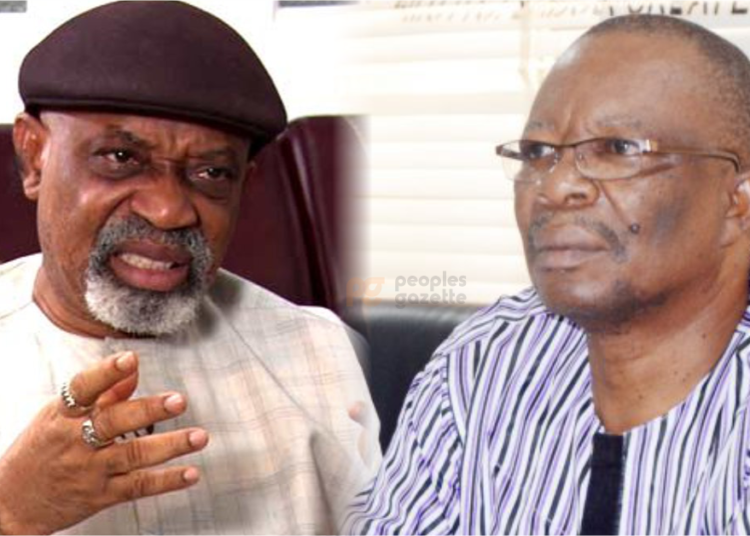President Muhammadu Buhari has directed the minister of education, Mallam Adamu Adamu, to resolve the prolonged strike embarked upon by the four university-based unions and report back to him in two weeks’ time.
President Buhari gave the directive yesterday after he received briefings from the relevant government Ministries, Agencies and Departments involved in resolving the face-off with the university unions.
LEADERSHIP had published a report of the findings of its Data Mining Department which disclosed that ASUU’s ongoing strike is the 16th since Nigeria’s return to democracy in 1999, shutting down academic activities in public universities for a cumulative period of more than four years within 23 years, a duration that is sufficient to complete a four-year degree programme, with some strikes lasting few weeks and others for several months.
And as if responding to the report, Buhari, after hearing from the concerned MDAs, ordered the minister of education to ensure that the impasse was resolved within two weeks and a report of the resolution brought to him.
Sources at the meeting also said that President Buhari directed that the minister of labour and employment, Senator Chris Ngige, must be in any of the meetings to resolve the crisis.
The sources said the secretary to the government of the federation (SGF), Boss Mustapha, would be part of the team to interface with the striking unions.
One of them said the president commended Ngige for his efforts so far to resolve the face-off.
Those at the meeting were ministers Adamu, Education; Dr. Zainab Ahmed, Finance, Budget and National Planning; Ngige, Labour; and Isa Pantami, Communications and Digital Economy.
Also present was the head of service of the federation, Dr. Folashade Yemi-Esan; chairman of National Salaries Income and Wages Commission, Ekpo Nta, and the director-general budget office, Ben Akabueze.
The Academic Staff Union of Universities (ASUU) had proceeded on a one-month warning strike on February 14, this year, and other unions also withdrew their services after that as a result of the alleged inability of the federal government to meet up with their demands.
The three other unions that embarked on strike are the Senior Staff Association of Nigerian Universities (SSANU), the Non-Academic Staff Union of Allied and Educational Institutions (NASU) and the National Association of Academic Technologists (NAAT).
ASUU Blames Ngige, Says Strike Continues
ASUU has, however, ruled out any possibility of suspending its six-month-old strike.
Addressing journalists in Abuja yesterday, ASUU president, Professor Emmanuel Osodeke, accused the Ministry of Labour and Employment, headed by Dr. Chris Ngige as “conciliator,” for continuously creating more chaos in the resolution process.
ASUU had on February 14, 2022 embarked on a strike to press home its demand, including the government’s investment in the nation’s university infrastructure, and payment of members’ salaries through the recommended University Transparency and Accountability Solution (UTAS), among several others.
At the end of the 30 days, the federal government failed to resolve the issues and ASUU subsequently rolled over the strike on March 14. More recently, the union declared another 12 weeks’ strike.
Osodeke said the union will never suspend the strike but ensure it put a permanent end to it.
He said minister of Labour and Employment “has taken upon himself the role of unabashed protagonist in its ongoing dispute with the government of Nigeria for some inexplicable reasons.
“Dr Ngige earlier told whoever cared to listen that he was not the employer of university academics and advised the union to march to the Ministry of Education. Nigerians may wish to know why he has suddenly turned around to constitute himself into an impediment to an amicable resolution of the ongoing crisis.”
The union said it remains focused on its goal of making the Nigerian university system internationally competitive and getting its products to stand shoulder-and-shoulder with their peers in any part of the world.
“We appreciate the teeming Nigerians for identifying with our vision in this respect. We specifically acknowledge the support and sacrifices of our students (including our members who are running their postgraduate programmes) as well as their parents; they are our critical partners in this transformation project. We in ASUU shall do our utmost best not to let you down.
“ASUU appreciates your concerns and sympathetic support. We are as bothered as you are because we share a common interest in the Nigerian project. However, ASUU shall continue to be guided by the sacred canons of integrity, objectivity, and responsibility to which both academics and media practitioners subscribe.”
He expressed hope that the ongoing process would culminate in resolving the impasse in the best interest of Nigeria.
Speaking further, Osodeke said if Ngige means well as a “conciliator, he won’t be putting roadblocks on the path to completing a process that has dragged for more than five years.
“The Ministry of Labour and Employment, as the chief labour ministry of the country, is principally expected to apprehend disputes between employers and employees with a view to settling such disputes.
“The Ministry shall normally await reports of disputes by either side to the disputes for settlement. When the Minister apprehends a dispute, he/she must communicate to the parties or their representatives his or her own proposal for the resolution of the dispute.
“However, ASUU has always had serious reservations about the claim of “conciliation” by someone who has taken sides in the dispute, or by unabashed protagonist in the crisis such as the current Minister of Labour and Employment. It is antithetical to the International Labour Organisation (ILO) Conventions (98, 151 & 154) on collective bargaining.
“It is against the principle of natural justice and the doctrine of equality for Dr. Ngige who carries himself as if he has personal scores to settle with ASUU and shoots down the Union everywhere it matters to assume the role of conciliator,” he added.
On the issue of funding of public universities, he said it had become the pastime of government officials to talk tough about billions and trillions of naira whenever the thorny issues of education and health sectors’ funding come up for mention.
However, he lamented that various sums of money in the same region which could have been deployed for human capacity development and public good usually disappear into thin air at the end of the day.
“We are, therefore, not surprised that the leadership of the Ministry of Labour and Employment could condescend to the point of denigrating the import of massive injection of fund into the university education sub-sector as they tried to miserably dismiss the vexed issue of funding Nigerian public universities and uplifting the country’s intellectual capital. While government and its agents would like to look at the issue in the here and now and funding as a one-off matter, we prefer to look at it longitudinally.
“ASUU believes that the idea of availability of funds is a dynamic process. For instance, government can mobilise funds from different sources, including non-budgetary outlets like stamp-duty, GSM and alcoholic taxes.
“We are appalled by the recent calls by top government officials at both federal and state levels to establish more universities at a time agencies run by same chief executives are tightly squeezed for funding.”
The ASUU chief executive restated the union’s opposition to the proliferation of universities and other tertiary institutions ‘merely for political gains or electoral value’.
“Nigerians should read through the intentions of hypocritic political jobbers when dangling the carrots of siting institutions they have no intention of developing to compete with others in Africa and beyond,” he said.
Reacting to the report on a breakaway faction of ASUU, Congress of University Academics (CONUA), Osodeke said the union does not recognise any faction.
We Won’t Accept Any Disparity In Varsity Salaries – SSANU
Meanwhile, the Senior Staff Association of Nigerian University (SSANU) yesterday said it will reject attempts by the Nimi-Briggs Committee to bring forward disparity in university staff salaries.
This is coming as the association applauded President Muhammadu Buhari for his intervention in the ongoing strike embarked upon by the university-based unions.
The association commended minister of Labour and Employment, Dr Chris Ngige, for his dexterity in ensuring that all university-based unions are carried along in the renegotiation exercise, even as it threatened legal action against such a move to ensure that it didn’t happen.
SSANU national president, Comrade Mohammed Ibrahim, stated this in a statement he issued in Abuja on the alleged proposed salary disparity by the Nimi-Briggs Committee for university staff.
He said, “We have read in the media that there is a proposal for the review of salary for University staff with a differential of teaching staff taking between 108 to 180 percent and an unreasonable figure of 10 percent for non-teaching staff.
“We are shocked to read that the Nimi Briggs Committee has submitted a report to the government while we only met with them twice. To say the least, SSANU is not happy with the pace of work in that committee.
“We are seriously shocked and taken aback by the media report that a certain miserable, unacceptable percentage was recommended to non-teaching staff. We, therefore, advise that the committee should, as a matter of urgency, conclude renegotiation with us.”
According to SSANU, any attempt to give preferential treatment to any group will not only be unfair but unjust and inhumane.
“For us that story remains a rumour but if there is any truth in it, SSANU will resist it with every possible legal means available to us,” he added.





